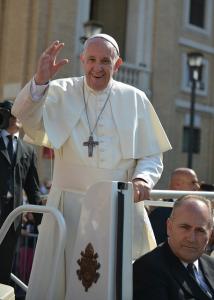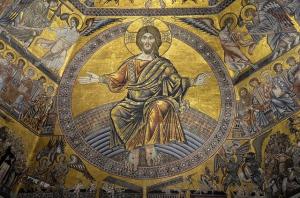So today was All Souls, a.k.a. Día de los Muertos or Day of the Dead. Today, western Catholics pray for the souls of all our dead (hence anti-Catholic propagandist Lorraine Boettner’s decision that we call it Purgatory Day, which, no, no we don’t). I particularly like today’s liturgy in the Anglican Use, so I wanted to share some of the texts we use. (Interestingly, the Collect is directed to the Son, rather than to the Father as usual.)
Also, while we’re here: tomorrow is the tenth anniversary of Anglicanorum Cœtibus, the document that laid the foundation for the Ordinariates. Anyone who goes to an Ordinariate parish and prays the Te Deum tomorrow will be eligible for a plenary indulgence, under the usual conditions. (1)
Collect of the Day
O God, the Creator and Redeemer of all them that believe: grant unto the souls of thy servants and handmaids the remission of all their sins; that as they have ever desired thy merciful pardon, so by the supplications of their brethren they may receive the same; who livest and reignest with the Father, in the unity of the Holy Ghost, ever one God, world without end.
The Lesson (RSV-CE Translation)
The souls of the righteous are in the hand of God, and no torment will ever touch them. In the eyes of the foolish they seem to have died, and their departure was thought to be an affliction, and their going from us to be their destruction; but they are at peace. For though in the sight of men they were punished, their hope is full of immortality. Having been disciplined a little, they will receive great good, because God tested them and found them worthy of himself; like gold in the furnace he tried them, and like a sacrificial burnt offering he accepted them. In the time of their visitation they will shine forth, and will run like sparks through the stubble. They will govern nations and rule over peoples, and the Lord will reign over them for ever. Those who trust in him will understand truth, and the faithful will abide with him in love, because grace and mercy are upon his elect.
Tract
Absolve, O Lord, the souls of all the faithful departed: from every bond of sin.
And by the help of thy grace: may they be worthy to escape the avenging judgment.
And enjoy the bliss: of everlasting light.
Offertory
O Lord Jesus Christ, King of Majesty, deliver the souls of all the faithful departed from the hand of hell, and from the pit of destruction. Deliver them from the lion’s mouth, that the grave devour them not; that they go not down to the realms of darkness.
But let Michael, the holy standard-bearer, make speed to restore them to the brightness of glory: which thou promisedst in ages past to Abraham and his seed.
Sacrifice and prayer do we offer unto thee, O Lord: do thou accept them for the souls departed, in whose memory we make this oblation.
And grant them, Lord, to pass from death unto life, which thou promisedst in ages past unto Abraham and his seed.
Preface
It is very meet, right, and our bounden duty, that we should at all times, and in all places, give thanks unto thee, O Lord, holy Father, almighty, everlasting God; through thy Son Jesus Christ our Lord; who rose victorious from the dead, and doth comfort us with the hope of everlasting life; for to thy faithful people, O Lord, life is changed, not ended; and when this earthly dwelling doth turn to dust, there is prepared for us a dwelling-place eternal in the heavens. Therefore with angels and archangels and all the company of heaven, we laud and magnify thy glorious name; evermore praising thee, and saying, [Sanctus-Benedictus]
Absolution of the Dead: Responsory
Deliver me, O Lord, from death eternal in that fearful day:
When the heavens and the earth shall be shaken:
When thou shalt come to judge the world by fire.
I am in fear and trembling
Till the sifting be upon us, and the wrath to come,
When the heavens and the earth shall be shaken.
O that day, that day of anger, of calamity and misery,
A great day and exceeding bitter,
When thou shalt come to judge the world by fire.
Rest eternal grant unto them, O Lord:
And let light perpetual shine upon them.
Deliver me, O Lord, from death eternal in that fearful day:
When the heavens and the earth shall be shaken:
When thou shalt judge the world by fire.
Final Antiphon
May the angels lead you into Paradise;
May the martyrs receive you at your arrival
And lead you to the holy city, Jerusalem.
May choirs of angels receive you
And with Lazarus, once poor,
May you have eternal rest.
(1) An indulgence is divine release from the temporal consequences of a forgiven sin. To get the idea, imagine you broke a friend’s vase. Then you apologized, and offered to pay to replace it, since you owe them that much. Your friend accepting your apology is forgiveness, while them waiving the payment is indulgence, which may or may not be offered. The Catholic Church claims the power of the keys, the binding and loosing of both sins and their consequences, and thus the power of extending indulgences, which are normally attached to specific acts of piety—thus helping to ensure that you don’t lose the good that experiencing consequences would have done you. (Consequences you don’t experience in this life are “processed” in Purgatory, which is why indulgences can also be obtained by the living for the dead.)
Most indulgences are partial, i.e. they let you off only some of the consequences of your sins. A plenary indulgence lets you off all the consequences of all your sins, and can be obtained only if (i) you are completely detached from all your sins, even trivial ones; (ii) you go to Confession; (iii) you receive the Eucharist; and (iv) you pray for the Pope’s prayer intentions. If one or more of those conditions is lacking, you still obtain a partial indulgence by doing whatever a plenary indulgence is attached to.












